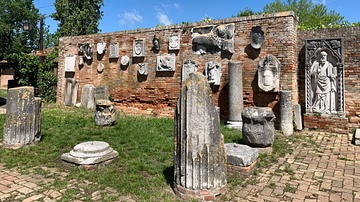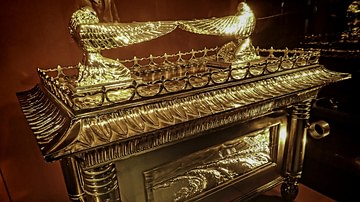Search
Did you mean: Helios?
Search Results

Article
Torcello – Tracing the First Settlers of the Venetian Lagoon
Venice was one of the most powerful empires in maritime history. It is now a leading tourist attraction and a must-visit for anyone interested in history and cross-cultural influence. People are drawn to this picturesque city to see the canals...

Video
India-Sanchi (Buddhist/Great Stupa)
Sanchi: The Buddhist vihara at Sanchi, famous for its Great Stupa is located at Sanchi Town in Raisen District of the state of Madhya Pradesh, India, it is 46 km north-east of Bhopal. The Great Stupa at Sanchi is the oldest stone structure...

Definition
Inca Civilization
The Inca civilization flourished in ancient Peru between c. 1400 and 1533 CE. The Inca Empire eventually extended across western South America from Quito in the north to Santiago in the south. It was the largest empire ever seen in the Americas...

Definition
Byzantine Empire
The Byzantine Empire existed from 330 to 1453. It is often called the Eastern Roman Empire or simply Byzantium. The Byzantine capital was founded at Constantinople by Constantine I (r. 306-337). The Byzantine Empire varied in size over the...

Definition
The Medieval Church
Religious practice in medieval Europe (c. 476-1500) was dominated and informed by the Catholic Church. The majority of the population was Christian, and "Christian" at this time meant "Catholic" as there was initially no other form of that...

Definition
First Crusade
The First Crusade (1095-1102) was a military campaign by western European forces to recapture the city of Jerusalem and the Holy Land from Muslim control. Conceived by Pope Urban II following an appeal from the Byzantine emperor Alexios I...

Definition
Siddhartha Gautama
Siddhartha Gautama (better known as the Buddha, l. c. 563 - c. 483 BCE) was, according to legend, a Hindu prince who renounced his position and wealth to seek enlightenment as a spiritual ascetic, attained his goal and, in preaching his path...

Definition
Crusades
The Crusades were a series of military campaigns organised by popes and Christian western powers to take Jerusalem and the Holy Land back from Muslim control and then defend those gains. There were eight major official crusades between 1095...

Definition
English Reformation
The English Reformation began with Henry VIII of England (r. 1509-1547 CE) and continued in stages over the rest of the 16th century CE. The process witnessed the break away from the Catholic Church headed by the Pope in Rome. The Protestant...

Definition
Ark of the Covenant
The Ark of the Covenant refers to the box-like container that held the tablets of the Law received by Moses on Mount Sinai. Tradition claimed that it contained two stone tablets, carved by God, listing the first ten commandments given to...